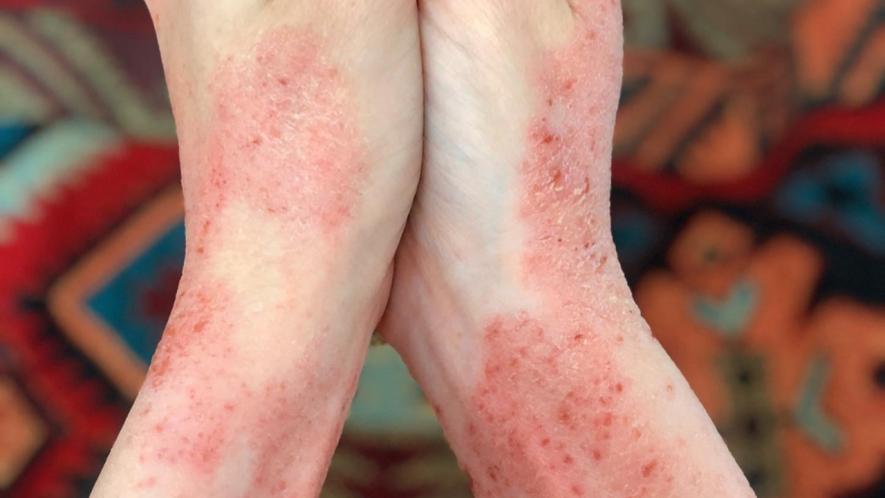By Acting Directly on Nerve Cells, Common Bacterium Triggers Skin Itching: Study

Representational image. | Image courtesy: Wikimedia Commons
Staphylococcus aureus is the scientific name of a common skin bacterium and this has a peculiar way of triggering skin itching, a potentially unpleasant sensation. A team of researchers from Harvard Medical School, in a latest research paper published in Cell said that the bacterium causes skin itching by directly acting on nerve cells. The research was based on experiments on mice and human cells.
Experts believe that the new findings are an important addition to the problem of how common skin conditions like eczema and atopic dermatitis (characterised by itchy skin rash) are associated with persistent itching and to find alternate treatments.
Our skin homes a variety of microorganisms, and in conditions like eczema and atopic dermatitis, the equilibrium of skin microbes is distorted, and Staphylococcus aureus can flourish, according to the researchers. Till now, the itching skin associated with such conditions has been considered to arise from inflammation due to the infection. But the new research has unveiled an even clearer picture of how the S aureus bacterium single-handedly triggers itching with the help of a chain reaction. It may not strictly be associated with the infection inflammation.
The experiments carried out by the researchers showed that S aureus releases a chemical which activates a protein on the nerves that transmit signals from the skin to the brain. If the activation of the nerve protein is blocked, then the itching sensation wanes.
Commenting on the findings, the study's corresponding author, Isaac Chiu, who is an associate professor of immunology at Harvard Medical School, was quoted to have said, “ We’ve identified an entirely novel mechanism behind itch — the bacterium Staph aureus, which is found on almost every patient with the chronic condition atopic dermatitis. We show that itch can be caused by the microbe itself.”
The Experiments
In the first experiment, the researchers applied a strain or variant of the S aureus bacterium known as the Methicillin-Resistant Staphylococcus aureus (MRSA), which is resistant to Methicillin drug. The mice treated with MRSA were found more likely to develop dermatitis and scratched far more than those without the treatment. The mice became so sensitive that even a tiny filament could cause itching on them. This is also the situation in people with eczema, where the rubbing of wool on their skin can cause annoying itches.
Then the team went on to discover what exactly causes the scratches and finally found an enzyme named V8 protease (a protein) is the factor. The researchers also found that when this enzyme is injected into the mice, it causes scratching on the skin. The team also found in skin swabs from human patients with atopic dermatitis to have the indication of containing V8 protease at a higher level, the research findings suggest.
The researchers went on with their experiments on how the specific enzyme triggers itching and found that it interacts with nerve cells found on the skin, which transfer signals from the skin to the brain.
The V8 protease enzyme can bind to some receptors present in the nerve cells (neurons), and this leads to the triggering of itching. The binding event carries itch signals to the brain, and the brain produces the sensation in return. This, the researchers confirmed by blocking the receptors where the enzyme binds when the itchiness subsided. The blocking of the receptors was done by applying an anti-clotting drug.
However, some experts opined that there is a need to extend the experiments on humans before something conclusive can be drawn. Despite this, the study is welcomed by consultant dermatologist and British Skin Foundation spokesperson Emma Wedgeworth, who was quoted as commenting in a Guardian article, “Whilst we have previously recognised that staph aureus plays an important role in eczema, its contribution to itch has not previously been recognised. Hopefully, this understanding will translate into new treatment options helping to tackle the misery of itch and eczema.” She further added that the study highlighted the pivotal and direct impact of disruptions to the skin microbiome.
Get the latest reports & analysis with people's perspective on Protests, movements & deep analytical videos, discussions of the current affairs in your Telegram app. Subscribe to NewsClick's Telegram channel & get Real-Time updates on stories, as they get published on our website.















